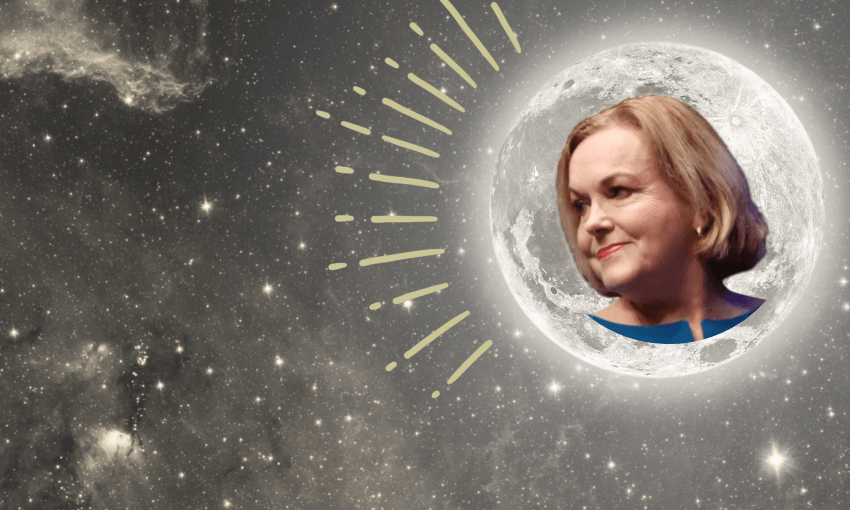An ongoing survey measuring child poverty has been axed, and a longitudinal study of child health is at risk. Are we throwing the literal baby out with the bathwater?
The year is 2034. Four journalists and 120 trained bots assemble to report on a speech from the prime minister in the nation’s capital, Hamilton.
Elected after a mass rejection of KPIs, career politicians, 10 years of no weekend trains in the former capital and age spots, the 36-year-old prime minister and former skincare influencer from Masterton has good news.
The Stats NZ’s Living in Aotearoa survey has revealed a heartening decrease in the persistence of childhood poverty. Newly released research from Growing Up in New Zealand shows an expanded pilot has reduced the number of Pasifika young adults with rheumatic heart disease from 1 in 50 to 1 in 100.
Popping on a facemask, the PM heads off to record her thoughts for the Alexander Turnbull Library. A lone journalist searches out a 2022 Newshub Nation interview with Dame Jacinda Ardern as background to a story about child poverty reduction. Judith Collins celebrates being named New Zealand’s chef de mission for the 2036 Olympic Games, hosted on the moon after complaints from the Federation of Squid Game players about having to competitively die in 44-degree heat, by crushing a moonbuggy.
Based on recent announcements, we can assume four things in this twisted fictional scenario will not come to pass: the Stats NZ survey has been axed, the Growing Up in New Zealand study has a question mark hanging over it, the prime ministers’ interview series has been ended, and the Newshub website will go down with the Newshub ship. Collins waving at us from space is now more likely than having 12 years of complete data on the persistence of child poverty.
Last Saturday, Newsroom’s Laura Walters reported that Stats NZ will stop its Living in Aotearoa survey as part of cost-saving measures. The survey panel was set up in 2022 as a way to track the persistence of child poverty. It’s one of ten measures set down in the Child Poverty Reduction Act and, unlike the other nine, requires longitudinal data. The alternative offered is using an enhanced Household Economic Survey, but that doesn’t have the same ability to track changes over time the way longitudinal studies do.
The day before, RNZ’s John Gerritsen revealed the Ministry of Social Development had not renewed its funding contract for the Growing Up in New Zealand (GUiNZ) study. The University of Auckland research is the largest longitudinal study of child health in the country and has been following the lives of 6,000 kids for 15 years. Listed on the (GUiNZ) website are over 180 current or past research projects that draw on the study’s data.
The study’s fate now lies in the hands of government ministers. There is a trace of hope, with social development and employment minister Louise Upston saying the government “would like to see it continue.”
These two announcements shine particularly bright in light of the government’s pursuit of evidence-based policy and accountability. Equally as stark is the bipartisan view that child poverty and its resultant impact on our kids is a shameful scourge. In the short term, some will sheet the blame towards the current government. The current government will blame the last one. The previous government’s failure to bed things in has left loose ends all over the place.
The free school lunch programme, currently under review, seems like a case for the merits of longitudinal research like the GUiNZ study. Associate minister of education David Seymour wants a “robust, statistically significant comparison that has been able to find that the programme has increased attendance at school.” Longitudinal research can provide that kind of comparison, and it would have a much better shot at decoupling short-term drivers of non-attendance and underachievement from the impact of ongoing food poverty. Unfortunately, it doesn’t deliver quick results or ammunition for quick political decision-making.
The confirmed loss of the Stats NZ survey and the uncertainty surrounding the GUiNZ study brings an all too literal meaning to throwing the baby out with the bathwater. Plus, there’s been another loss of source material recently that would have helped us to write our current present as history and make sense of whatever the future holds.
Last week, the Herald’s Thomas Coughlan reported that the Alexander Turnbull Library would be ending its 40-year-old project interviewing prime ministers. For future historians, it’s a treasure chest of riches, now timestamped 1984-2024. We will never know how Chris Luxon or Chris Hipkins truly felt about their word clouds. There’s also something inherently sad about the loss of a forum for candour and catharsis that, compared to all the crafted, trite and rapid-fire political ephemera, feels rebellious.
Yesterday, it was confirmed that the Newshub website will disappear. Warner Brother’s Discovery has said they “know that our archive has great historical significance and needs to be preserved. It is our intention to engage Nga Taonga to explore how that can happen. We envisage this will take some time to work through.”
That’s heartening, and thank God for Nga Taonga, but just as Today FM’s site content and large chunks of The Project have disappeared from public view, so too will Newshub. There’s a horrible irony in relying on the same global technology platforms whose dominance has created irreversible and tectonic shifts in the media landscape to make our own current and historic affairs broadly discoverable.
The year is 2034. Global tech giant MetaByteBet has blocked all news from being published online. Plans are underway to once again try to tackle child poverty. Labour prime minister Chris Christopher is launching a new survey that will measure something.
Christopher tells his confidant-bot that it’s been a tough day. One in 30 young adults in South Auckland has some form of rheumatic heart disease. Judith Collins waves from space.

